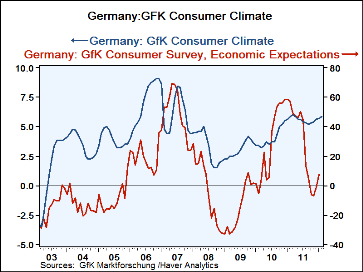 Global| Jan 26 2012
Global| Jan 26 2012German Confidence Edges Upward
Summary
The GFK index of German consumer confidence gives hardly any notion of it being a country in the middle of a zone beset with real economic troubles. In the graphic, the GFK confidence line portrays a very steady ongoing upward rise [...]
 The GFK index of German consumer confidence gives hardly any notion of it being a country in the middle of a
zone beset with real economic troubles. In the graphic, the GFK confidence line portrays a very steady ongoing
upward rise with a gradient possessed of only some very mild swales in it on the way up.
The GFK index of German consumer confidence gives hardly any notion of it being a country in the middle of a
zone beset with real economic troubles. In the graphic, the GFK confidence line portrays a very steady ongoing
upward rise with a gradient possessed of only some very mild swales in it on the way up.
The table below presents the German reading in the context of confidence/sentiment readings from several other large EMU members. The results are striking. The German index stands in the 84th percentile of its historic queue. Meanwhile, Italy’s ISAE reading is in the bottom 1.1% of its range, France’s Insee metric is in the bottom 6.5% of its legacy readings and the UK GFK reading stands in the lower 8.6% of its queue.
Clearly Germany is in a world of its own. It is as though German consumers are living on another planet, planet Deutschland.
However, the German buying and income sub-indices are much stronger than their economic counterpart index. The buying index stands in the top 10% if its queue and the income reading stands in the top 16% of its. But the German economic index, a component of the GFK overall index, stands at the 51st percentile of its historic queue. This is not weak but middling, yet it is far weaker than the other components for the German index and yet still much stronger than the readings for fellow EMU nations.
On balance Germany is still sheltering its consumers and economy from the Euro-storm. But since Germany is an economy that relies on exporting and external demand to fire its exports and support its domestic economy, we have to wonder why its consumers are not more worried by the world around it. The planet Germany may have its own orbit but when neighboring planetary orbits are disturbed their gravitational pull on Germany will shift and its orbit will wobble too. Is Germany in denial or can it continue to be so resilient? How does it plan to evade the forces of weakness that are sweeping through Europe? I don’t think it can.
| Germany Consumer Climate Survey GFK | Other EU Members | ||||||
|---|---|---|---|---|---|---|---|
| Climate | Expectations | Propensity to | Consumer/Household Confidence | ||||
| Economic | Income | Buy | Italy:ISAE | France:Insee | UK:GFK | ||
| Feb-12 | 5.9 | #N/A | #N/A | #N/A | #N/A | #N/A | #N/A |
| Jan-12 | 5.7 | 7.5 | 34.1 | 41.8 | 91.6 | 81.0 | #N/A |
| Dec-11 | 5.6 | -0.9 | 34.0 | 27.4 | 91.6 | 80.0 | -33.0 |
| Nov-11 | 5.4 | -7.2 | 31.1 | 40.3 | 96.1 | 81.0 | -31.0 |
| Oct-11 | 5.3 | -6.2 | 36.5 | 31.2 | 93.0 | 84.0 | -32.0 |
| LEVELS | Current | Lagged One Month | 2Mo Lag | ||||
| Average | 4.6 | 11.2 | 6.4 | 9.6 | 100.9 | 90.6 | -15.4 |
| Max | 9.1 | 69.5 | 45.2 | 64.4 | 108.7 | 107.0 | 1.0 |
| Min | 1.5 | -32.9 | -20.5 | -41.1 | 91.6 | 79.0 | -39.0 |
| % range | 57.9% | 39.5% | 83.1% | 78.6% | 0.0% | 7.1% | 15.0% |
| Count% | 84.0% | 51.1% | 84.0% | 90.4% | 1.1% | 6.5% | 8.6% |
| % range is current reading as a percentile of Hi/Low range | |||||||
| Count % is current reading ranked as a %-tile among all readings | |||||||
| GFK survey dates from January 2002 | |||||||
Robert Brusca
AuthorMore in Author Profile »Robert A. Brusca is Chief Economist of Fact and Opinion Economics, a consulting firm he founded in Manhattan. He has been an economist on Wall Street for over 25 years. He has visited central banking and large institutional clients in over 30 countries in his career as an economist. Mr. Brusca was a Divisional Research Chief at the Federal Reserve Bank of NY (Chief of the International Financial markets Division), a Fed Watcher at Irving Trust and Chief Economist at Nikko Securities International. He is widely quoted and appears in various media. Mr. Brusca holds an MA and Ph.D. in economics from Michigan State University and a BA in Economics from the University of Michigan. His research pursues his strong interests in non aligned policy economics as well as international economics. FAO Economics’ research targets investors to assist them in making better investment decisions in stocks, bonds and in a variety of international assets. The company does not manage money and has no conflicts in giving economic advice.
More Economy in Brief
 Global| Feb 05 2026
Global| Feb 05 2026Charts of the Week: Balanced Policy, Resilient Data and AI Narratives
by:Andrew Cates






